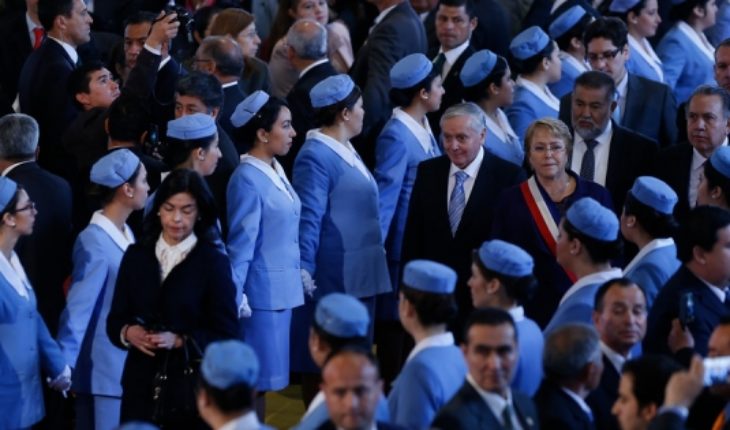the Evangelical growth is exponential and makes to OME decades shown a growing implementation of its churches in the Executive Branch and legislative branch of several countries in the region. These days the attention concentrated the evangelicals and especially Pentecostals Brazilians by have been transformed into one of the pillars of Jair Bolsonaro overwhelming victory in the presidential election, in their first interviews after the first round, the right candidate thanked especially evangelicals and exmilitares. Everything indicates that a new leadership of both sectors is very likely in the second round.
However, the phenomenon goes far beyond dispute by the Presidential Palace of Planalto. Indeed, nobody down the idea that evangelicals are an electoral force increasingly compact and in some elections almost decisive, overcoming this heterogeneity which is so characteristic for them. And it is that the agenda that represent – even if it is shaded from one country to another – points to very specific issues such as his opposition to abortion, the equal marriage, euthanasia and those derived from the so-called ideologies of gender.
Evangelical growth and its emergence in the politics of large Latin American countries was already observed in the recent elections in Mexico, which generated a so intense bond with the elected Andrés Manuel López Obrador, which should not be surprising if he appoints Ministers or Senior Evangelical in his next Government. These already represent 10% of the Mexican population and act in politics through the Social encounter party (PES), which despite being small, right, conservative, part very active coalition that leads the movement of national regeneration (MORENA). Carryover, he pulled out a good number of parliamentarians. Own calculations in the environment of Lopez Obrador indicate that PES brought you the not inconsiderable amount of 1.5 million votes.
Bad negotiators and bad movers on policy, these pastors do not seem to be. However, the history of the first forays into politics, surely not bring them memories.
The first Evangelical in coming to power was the Guatemalan general Efraín Ríos Montt, in 1982 through a coup d ‘ état, motivated by his personal motto “God’s anointed” to govern. However, the 2013, Ríos Montt was found guilty of genocide and sentenced to 80 years in prison, although a new trial allowed him to die in the tranquility of your home, assisted by his brother, a Catholic priest.
Meanwhile, in Peru, an important part of the change 90 party that led to power to Alberto Fujimori were groups of Pentecostal churches, even one of them, the pastor of the Christian Church and missionary, Carlos García and García was one of its Vice-Chairmen (1990-1992).
In 2016, another Evangelical Guatemalan came to power, Jimmy Morales. An old man of television, belonging to a sect called Evangelical Institute of Latin America and which today is immersed in disputes not very edifying. Meanwhile, in April this year, in Costa Rica the preacher and Gospel singer, Fabricio Alvarado, he won the first round, although he lost the ballot.
But attention is put today in Brazil, where evangelicals – mainly the Pentecostals – have grown from 15% in 2000 to 27% in 2017, according to the Brazilian Institute of geography and statistics (IGBE). However, DataFolha polls already speak of 31% of the population.
Little is known about how much influence have, indeed, Jair Bolsonaro environment nor less than how much they achieved in his future administration. Bolsonaro is Catholic non-observant, although his son Flavio is Baptist and its electorate, enough variegated and diverse cultures to think that you must balance their final decisions. Conversely, if you were to give a hypothetical triumph of the candidate of the party of the workers (PT), Fernando Haddad, turbulence shall be borne by the evangelicals, since it is in this universe where lies one of the most tenacious positions against the inheritance of Lula.
At the legislative level, the Evangelical Brazilians already have own Caucus, Lullism pejoratively called BBB – ox, bullet and Bible – and that was vital in the impeachment to Dilma Rousseff. There, unite efforts with former military and rural calls. The parliamentary results indicate that from the legislative point of view, Bolsonaro seemed to be able to offer greater than the PT stability.
Meanwhile, those who have contributed most to generate this environment not conducive to Lula dolphin are the leaders of two Pentecostal churches, the Universal Church of the Kingdom of God and the assemblies of God.
The first is a very active Church of vast communicational power, since their maximum exponent and founder, Edir Macedo is leader of the Brazilian Republican party that controls several municipalities, including Rio de Janeiro from 2016 and to which he belonged from the 2006, José Alencar, a Vice President of Lula.
Macedo is the owner of a vast network of media headlines on TV Record, the oldest in the country, formed by radio and TV stations with a presence in all countries where Portuguese is spoken. The Church was founded in 1977, has 320 bishops and 14 thousand pastors spiritually serving more than 10 million faithful.
On the other hand, the Convention national assemblies of God – especially the so-called Ministry Belem led by José Wellington Bezerra da Costa – it is also pentecostal home, brings together several million faithful in Brazil and abroad and has folded in a way very enthusiastic for the candidacy of Bolsonaro.
Many of these Pentecostal leaders supported the early years of the Lula administration in Exchange for favors, but were drifting away as corruption began to beat up the PT.
Also, another figure of the Brazilian Pentecostalism that broke with the PT, a fact that is often omitted, is two-time presidential candidate environment, Marina Silva, belonging to the assemblies of God, and by his biography, a symbolic benchmark the Brazilian left. Silva was even Lula’s Environment Minister until 2008, when he broke with him for “no commitment to environmental policies”. Silva reached in the first round just over one million votes, which nobody knows where it will go in second round.
Therefore, the Evangelical rise and its emergence in politics is observable in various countries of Latin America, both large and small. On average, in the region of five people feels identified with those ordinary Christian, a trend that goes upward, especially in Central America. In Ecuador have become very strong especially in the indigenous communities, being her Evangelical Federation one of the Bras of the President, Lenin Moreno, while they have become great critics of the facts of corruption that took place under the mandate of Rafael Correa. Meanwhile in Colombia, they were opposed to the referendum on the peace agreement with the FARC and then his party called MIRA, unused enthusiastically backed the election of Ivan Duke as President.
Although the Evangelical irruption in politics is, in general terms, a relatively recent fact and therefore, there is yet little regional articulation between its different expressions of party, it seems that it has come to stay. The growth of the faithful is not one minor detail, which coincides with the discrediting of the Catholic Church.
Poured in this op-ed content is the sole responsibility of the author and do not necessarily reflect the editorial line nor the counter position.





